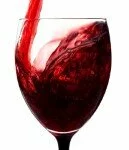 |
Find Your Medication |


Compound in red wine may offer potential treatment for heart disease
Drinking red wine in moderation has long been considered a healthy supplement. However, it has yet to be scientifically proven that an exact dose of red wine can help prevent the onset of certain diseases.
Drinking red wine in moderation has long been considered a healthy supplement. However, it has yet to be scientifically proven that an exact dose of red wine can help prevent the onset of certain diseases. In the meantime, a major conference to discuss the benefits of the compound found in red wine, resveratrol, will bring together researchers and experts from around the world. Resveratrol 2012 "At the University of Leicester, we want to see how resveratrol might work to prevent cancer in humans," said Karen Brown, PhD, professor and member of the University of Leicester's Cancer and Biomarkers and Prevention Group. "Having shown in our lab experiments that it can reduce tumor development we are now concentrating on identifying the mechanisms of how resveratrol works in human cells." A useful antioxidant? Over the course of 65 lectures and presentations, researchers hope to answer how resveratrol can be used as a treatment, as its effect in human clinical trials has only been tested during the past few years. Study findings by researchers at the university suggest that two glasses of red wine a day - considered an equivalent to the level of resveratrol necessary to be beneficial - goes beyond heart health and can reduce the rate of growth for bowel tumors. However, researchers urge that their findings are still in the preliminary stages at the moment, lacking any definitive results in their clinical trials. "A lot of people take resveratrol as a supplement, but at the moment we don't know how it works or on whom it can work until we have more information. With all the exciting new studies that are being done - especially the clinical trials - I hope we'll have a clearer picture in the next few years." |
See also ...
- New study finds that those with neurotic tendencies more at risk for PTSD
- Offering healthier snack options may help fight childhood obesity in the U_S_
- Cutting down on travel time could play a factor in weight loss
- Recent study associates childhood obesity risk with television in the bedroom
- New study touts weight-loss benefits of low-fat diets
- New study counters claim that eating small meals throughout the day is healthier
- Happiness in old age the result of successfully aging
- Study examines the potential for immediate PTSD treatment options
- New early detection procedure may help diagnose breast cancer
- Penn State program looks to teach siblings how to better communicate, resolve issues
- German study finds yoga may relieve chronic neck pain
- Research links high stress levels to noncardiac chest pain in children
- Certain jobs may increase the risk of breast cancer in women
- New study opens the door for targeting signs of eating disorders
- Study finds no correlation between lunar cycles and psychological problems
- Study: 1 million women may get screenings under ACA
- Strong family ties greatest deterrent for suicidal teenagers, new study finds
- New study measures meditation's lasting emotional response in the mind
- Signs of aging, not actual age, might be linked to heart disease
- Osteoporosis drug may be linked to the treatment of giant-cell tumors
- Scientists examine reasons for infertility in obese women
- Researchers publish guide for examining Alzheimer's prevalence among women
- Swiss organization offers advice on osteoporosis treatment
- Study recommends cholesterol reducing drugs, despite diabetes risk
- Harvard professor recommends Fosamax and Actonel for osteoporosis
- Despite struggling economy, medical cosmetics are still profitable
- Use of IUDs skyrockets, study says
- Broken bones may signal osteoporosis
- Study explains genetics behind OA
- Medicare patients take fewer medications because of high costs
- New guide warns of osteoporosis risk in men
- Researchers find potential treatment for resistant breast cancer
- Early medication treatments improve diabetes outcomes
- New study links calcium, vitamin D supplements to kidney stones
- Women benefit from statins the same as men
- Multiple statins yield additional cholesterol benefit
- Poorly managed blood sugar may lead to cognitive decline
- Arthritis treatment linked to liver damage
- Common treatment for knee pain found ineffective
- High cholesterol often goes untreated, report finds
- Government recommends against calcium, vitamin D for fracture prevention
- Saw palmetto may be useful complementary treatment for enlarged prostate
- Arthritis patients taking prescriptions experience best outcomes
- Antidepressants may reduce chemotherapy side effect
- Antidepressants may reduce pain of arthritis
- New study identifies brain cells that respond to antidepressant treatment
- Statin medications may improve cirrhosis treatment outcomes
- Blood test for diagnosing osteoarthritis developed
- Expert discusses long-term use of Fosamax
- Expert says people should take steps to avoid arthritis
| IMPORTANT DISCLOSURE: All medical content and news articles on this website is supplied by an independent third party company. While the information can be useful, this website relies on others for its creation and cannot guarantee the accuracy, medical efficacy, or reliability of the information provided. In all circumstances, you should always seek the advice of your physician and/or other qualified health professional(s) for drug, medical condition, or treatment advice. This website does not provide any medical advice. The content provided on this website is not a substitute for professional medical advice, diagnosis or treatment. |
- Terms & Conditions
- |
- Privacy Policy
- |
- Shipping Policy
- |
- My Account
- |
- Refill Prescription
- |
- Product Search
- |
- How to Order
- |
- Customer Service
- |
- About Us








